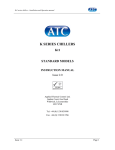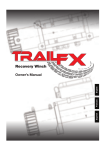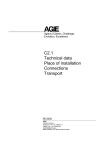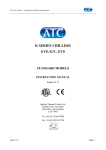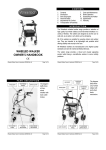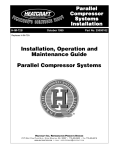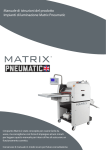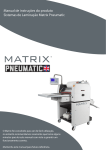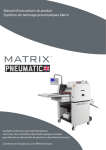Download Applied Thermal Control KTD Instruction manual
Transcript
K1, K3 series chillers – Installation and Operation manual K SERIES CHILLERS K1, K3 STANDARD MODELS INSTRUCTION MANUAL Issue 7.0 Applied Thermal Control Ltd. The Courtyard Whitwick Business Park Stenson Road Whitwick, Leicestershire LE67 4JP Tel: +44 (0) 1530 839998 Fax: +44 (0) 1530 813786 Issue 7.0 Page 1 K1, K3 series chillers – Installation and Operation manual Contents 1.0 Introduction Safety notices 3 4 1.1 Warranty registration 5 1.2 Unpacking 5 1.3 Site requirements 6 2.0 Installation 6 3.0 Operation 9 4.0 Maintenance and service requirements 11 4.1 Status lights and troubleshooting 11 Figure 1: K1, K3 internal features 14 5.0 Warranty terms and conditions 15 5.1 Return of goods procedure 16 6.0 Dimensions and performance 17 7.0 EC Declaration of Conformity 18 8.0 Returned Material documentation 19 Appendix 1: Water cooled condenser option 20 Appendix 2: Integral deionising cartridge system 21 Issue 7.0 Page 2 K1, K3 series chillers – Installation and Operation manual 1.0 Introduction By selecting a K series chiller you have invested in many years experience in the design and manufacture of precision temperature control instrumentation. ATC has built your K series chiller without compromise to meet the objectives of performance and reliability. Please read this manual carefully to ensure you understand the operation of the machine and how to use the unit safely and efficiently. If you have any questions regarding installation or repair of this unit please contact ATC direct. Applied Thermal Control Ltd. The Courtyard, Whitwick Business Park, Stenson Road, Whitwick, Leicestershire, LE67 4JP, UK Tel: Fax: e-mail: Issue 7.0 +44 (0) 1530 839998 +44 (0) 1530 813786 [email protected] Page 3 K1, K3 series chillers – Installation and Operation manual Safety For your safety we draw your attention to the following Warning and Caution statements throughout the manual, identified by the symbols… and i respectively. The safe operation of a KT series chiller remains the responsibility of the operator at all times. i Caution: Failure to comply with a Caution will invalidate product warranty and absolve ATC from any liability, howsoever caused, and could result in permanent damage to equipment. Warning: Failure to comply with a ‘Warning’ may result in personal injury or death. ATC does not accept any liability for injury caused through use of this equipment. Warning: No user serviceable parts. Warning: Very hot surfaces, in excess of 100°C Warning: Very cold surfaces and gases, lower than -40°C. Severe frostbite hazard. Warning: Opening the refrigeration system may expose the operative to toxic and corrosive compounds (HF). Take protective measures including suitable eye protection. Warning: Gases may exceed 300 psi (20 bar) during operation. Warning: All refrigerants do not support combustion and are asphyxiating gases. Warning: After switching off, the fan blades continue to rotate. Do not attempt service whilst the blades are rotating. Warning: All chillers contain water and electricity in close proximity. Always ensure the unit is isolated before service. All K series chillers are protected from over current by the master circuit breaker. Never bypass this component. i Caution: Filling/topping up of the tank should only be undertaken with the unit switched off, to prevent backflooding of the fluid. Issue 7.0 Page 4 K1, K3 series chillers – Installation and Operation manual i Caution: The high integrity refrigeration system contains no user-serviceable parts. Repair and service requires specialised knowledge and tools. Any unauthorised tampering with the refrigeration system automatically invalidates warranty. 1.1 Warranty registration i Caution: The warranty registration card must be completed and returned in order to activate cover. Failure to do so will limit warranty to three months from date of despatch from ATC. 1.2 Unpacking Please check that both the packaging and the unit are undamaged. If there is any doubt, it is vital that you inform both ATC and the carrier before making a claim on the carrier. There are no hidden shipping bolts or other fixings. You should inspect the packaging for signs of transit damage before signing for the unit, and if possible unpack the unit before signing. Once you have signed for the goods, ATC cannot be held responsible for any transit damage subsequently found. Remove the unit from its original packaging and ensure that there is no packaging left around the cooling ducts. Please retain all packaging in the unlikely event that the chiller needs to be returned to our local representatives. Issue 7.0 Page 5 K1, K3 series chillers – Installation and Operation manual 1.3 Site requirements · Hard, level surface. Ideally smooth to allow freewheeling of castors, which are designed for indoor use. · Clean, dust free environment. Air-cooled chillers move large volumes of air, and large amounts of air-borne contamination will result in fouling of the condenser, reducing the capacity of the unit and in extreme cases causing a system shut-down. · Non-condensing ambient, from +4°C to +40°C. Cooling capacity is lost above 30°C. · Electrical supply 230V ±10% (50Hz) single phase1. Internal circuit breaker is rated at 15 Amps, normal operating current is 7 Amps. · Clearance front and rear of the unit at least 250mm. · Plumbing to be clean and compatible with the fluid to be used. It is advisable that the minimum of right angle bends and compression fittings are used. See also section 2.0 2.0 Installation Having ensured that your installation meets all of the site requirements identified in section 1.3, it is best practice that the fluid lines between your application and the chiller have the following characteristics: i · Short · Large diameter (ideally at least 12mm internal diameter) · Free from right angle bends, to suppress water hammer · Opaque, ideally black, to inhibit growth of algae. Alternatively, use solid copper or welded ABS. Caution: Never use transparent tubing. 1 Switch selectable options for operation at 115VAC 60Hz, 230VAC 50Hz and 220VAC 60Hz are available on request. Issue 7.0 Page 6 K1, K3 series chillers – Installation and Operation manual · Clean. If your installation is to existing pipe work, it is good practice to flush the system with either a commercially available central heating cleaner or 5% acetic acid solution. The system should be flushed clean with tap water to remove all traces of cleaner prior to filling the system. All connections should be made using either the ATC ‘easy clamp’ or a jubilee type clip. Where threaded or compression type fluid joints are to be made, always use a suitable jointing compound such as PTFE tape. i Voltage selection Caution: If your K1 or K3 series chiller is rated for multi voltage and dual frequency operation, it is essential that the voltage selector switch on the chiller is set to match the voltage and frequency available at your site. The voltage selector switch cover plate can be found on the left side of the chiller when viewed from the front, mounted on the vertical support plate located behind the removable top cover. Access is gained by removing the top cover completely to expose the selector switch. Always replace the cover for normal operation. Having ensured that the system is correctly connected, with the inlets and outlets having the correct orientation relative to your application, all joints tight and leak free, and with the unit isolated from the electrical supply, prepare to fill the unit with Hexid fluid. Hexid fluids are the preferred coolant choice as they provide excellent corrosion protection, freeze protection, algae inhibition and good heat transfer properties. i Caution: Always use ATC recommended fluids in your K series chiller. Never use other anti-freeze mixtures, as they may corrode your application and will damage the K series pump seals. Issue 7.0 Page 7 K1, K3 series chillers – Installation and Operation manual Filling procedure 1. Check all valves are open, including solenoid valves located in your application. 2. Remove the filler access door in the top cover, then remove cover from the tank 3. Fill with Hexid to 30mm below the rim of the tank neck. 4. Switch the unit on. 5. Wait while the fluid level drops in the tank. 6. Switch the unit off. 7. Repeat steps 3 to 5 until all of the air has been purged from the system. 8. Top up to 30mm below the rim of the tank neck to ensure the level switch is made. 9. Check the system carefully for leaks, including the inside of your application. The system is now ready to be run. Warning: Always isolate the chiller from the electrical supply when filling the tank. Issue 7.0 Page 8 K1, K3 series chillers – Installation and Operation manual 3.0 Operation K series chillers have been configured to provide temperature stability to ±0.1°C. The chiller includes digital display and high/low temperature and low fluid level alarms. High temperature alarm: Preset at 15°C – neon only Preset at 25°C – neon, buzzer* and HI warning display Low temperature alarm: Preset at 8°C – buzzer* and LO warning display Low fluid alarm: Neon and buzzer* only * The buzzer can be muted by pressing the MUTE button on the controller. K series chillers are fitted with a high performance 3 term PID controller, which is capable of controlling temperature to within 0.1°C of set point. In addition, there is a high and low temperature warning via the LED and buzzer on the display of the controller, which is triggered if the temperature deviates more than 10°C from the set point. Adjusting the set point There are three buttons on the controller, used to adjust the setpoint. Whilst depressing button Ø, press button q or p to decrease or increase the setpoint respectively. If the set point is moved more than 10°C the alarm may be triggered and the unit will need to be switched off and then on to reset the alarm. It is not possible to set the temperature outside the preset values of -4°C and +35°C. Issue 7.0 Page 9 K1, K3 series chillers – Installation and Operation manual CAL controller error messages Message displayed Cause and correction InPt – FAiL Sensor has failed. Order replacement part number EA-038 Controller problem. Switch off, then on. If problem is persistent, order replacement part EA-055 Ambient temperature outside of permitted range, 5°C - 40°C Restart the controller to reset the alarm Fault on system. Refer to Troubleshooting, section 4.1 Data – FAiL - AL - (At start up) - AL - AL - (After changing setpoint) (During normal operation) Fluid flow and pressure K series chillers contain a high pressure volumetric pump capable of 150 psi. All units are supplied with a pre-set maximum of 50 psi. Pressures above this will cause the internal safety bypass valve to open, protecting your application from potentially dangerous pressures. It is possible for customers to change the operating pressure of the chiller, as follows: 1. Remove the cover from the chiller, giving access to the top compartment, figure 1. 2. With the chiller running, release the locking nut on the pressure relief valve. 3. Turn the valve knob anticlockwise to reduce the flow/pressure, clockwise to increase the flow/pressure. 4. The pressure can be observed on the gauge on the front panel. i Caution: Changing the flow/pressure with the pressure relief valve will also change the preset pressure safety setpoint. This will move to a lower pressure than the factory setting when decreasing the flow/pressure, and to a higher pressure when increasing the flow/pressure. Issue 7.0 Page 10 K1, K3 series chillers – Installation and Operation manual i Caution: When the flow/pressure is manually increased with the pressure relief valve, the safety provided by the valve will be effected at higher pressures than standard. For this reason, please ensure that it is safe for your application to operate at pressures in excess of 50 psi, even if the pressure setting on the chiller reads lower than this. A blockage in your application could result in the pressure exceeding the raised safety pressure, and while the K series chiller is tested to 120 psi, your application may not be safe at this pressure. We recommend that pressures exceeding 100psi must never be used. 4.0 Maintenance and service requirements i Caution: Failure to carry out service at the specified intervals may permanently damage your equipment. Interval Actions Weekly Check fluid level Monthly Check the condenser (air intake) is free from obstructions or accumulations of debris. Cleaning may be achieved with a domestic vacuum cleaner with brush attachment.* Annually Change the fluid. Check for fluid leaks throughout the whole system. Check the condenser for fouling. i * Caution: Never blow the condenser out with compressed air. 4.1 Status lights and troubleshooting The status panel on the front of your K1 chiller is fitted with three green lights, configured such that ‘three greens is good’; i.e. when they are lit, the parameter is operating within design limits. If an indicator light is not lit, this indicates an alert situation with the corresponding parameter, as follows: Issue 7.0 Page 11 K1, K3 series chillers – Installation and Operation manual TEMPERATURE COOLANT LEVEL COOLANT FLOW Issue 7.0 Page 12 K1, K3 series chillers – Installation and Operation manual Symptom Causes Compressor not running, but fan running Is the controller displaying an alarm? If there is no obvious cause, check… · The condenser is clean · Ambient not too high · No temporary power failure The likely cause is the compressor’s internal protection has been activated and should restart in five minutes. Noisy operation / High fluid pressure And/or low flow Check: · Pump filter, if fitted · No restrictions in the pipe work · Operating coolant pressure set too low Clean fluid path with weak detergent solution, flush and replace fluid with correct Hexid fluid. Fluid lines becoming fouled brown or green Algae contamination. Clean system with weak detergent solution, replace fluid lines with opaque (ideally black) lines to inhibit algae growth. Use Hexid fluid. Fluid seen leaking from system Under high humidity conditions, fluid may appear to be leaking from the system. This is usually just condensation, but it is always prudent to check for fluid leaks. Poor fluid flow Check: · Blocked filter – this is located under the hex nut on the pump body, when fitted. Flush with clean water, replace fluid with Hexid. Poor cooling Almost always caused by blocked condenser. Clean with soft brush or vacuum cleaner with brush attachment Continued failure may indicate high ambient or excessive load applied to the unit. Check these first Issue 7.0 Page 13 K1, K3 series chillers – Installation and Operation manual Figure 1: K1, K3 internal features Pressure gauge Electrical enclosure Plan view Tank Bypass valve Tank Rear view Issue 7.0 Page 14 K1, K3 series chillers – Installation and Operation manual 5.0 Warranty terms and conditions i. ATC provides a comprehensive return to base 2 year parts, 1 year labour warranty from delivery as standard on all new K series chillers, provided that they have been installed and operated in accordance with this manual. ii. At the discretion of ATC, goods may be serviced on site or a service loan unit may be supplied. Warranty cover excludes the cost of travel by engineers and loan unit rental charges. iii. During the first year of the warranty period, freight costs for shipping to ATC are for the customer’s account. Freight costs for shipping from ATC are for ATC’s account. iv. During the second year of the warranty, freight costs to and from ATC are for the customer’s account. Registration Please complete the warranty registration and return to ATC for initiation of warranty cover. Issue 7.0 Page 15 K1, K3 series chillers – Installation and Operation manual 5.1 Return of goods procedure If the unit is damaged during transit, or subsequently develop a fault requiring its return to ATC, the following procedure must be followed. 1. Call the ATC service point · You will be issued with a Return Materials Authorisation number (‘Q number’) and a Return Machine Declaration (RMD) form by fax. A copy of the RMD form is in section 8.0 of this manual. 2. Return the completed RMD form to ATC by fax, together with your purchase order number. 3. Pack the returning item securely, enclosing a copy of the completed RMD form, and ensure that the packaging is clearly labelled with the Q number. Neither ATC nor your shipper will be liable for any damage incurred in transit. 4. Upon receipt of the completed RMD form, an engineer will be allocated or a service loan unit* will be despatched if available. * Please note that ATC will raise an invoice as part of the service loan procedure, and you will receive a credit against this upon the safe return of the loan unit. Address for return units: Applied Thermal Control Ltd. Goods Inward Unit 14, The Courtyard Whitwick Business Park Stenson Road Whitwick Leicestershire, LE67 4JP UK Tel: +44 (0) 1530 839998 Issue 7.0 Page 16 K1, K3 series chillers – Installation and Operation manual 6.0 Dimensions and performance K1 K3 1750 Watts 3200 Watts 575 x 420 x 545 mm 720 x 550 x 560 mm 66 Kg 82 Kg 4°C - 35°C 4°C - 35°C P5, P10, P17 P5, P10, P17 1°C resolution standard. 0.1°C option. 1°C resolution standard. 0.1°C option. Autotune P.I.D. Autotune P.I.D. Standard Standard 3/8” and ½” barb supplied Custom connections available 3/8” and ½” barb supplied Custom connections available Temperature stability 0.1°C 0.1°C Power requirements 9 Amps, 230V 50Hz 10 Amps, 230V 50Hz 2 years parts, 1 year labour 2 years parts, 1 year labour Cooling Capacity Dimensions H x W x D Weight Temperature range Pumps available LED temperature display Temperature control Pressure gauge Fluid connections Warranty Issue 7.0 Page 17 K1, K3 series chillers – Installation and Operation manual EC Declaration of Conformity Applied Thermal Control Ltd. Units 10 & 14 The Courtyard Whitwick Business Park Stenson Road Whitwick Leicestershire LE67 4JP K series chiller range (all standard configurations) Serial Number: ………………… The equipment meets the requirements of EEC Directive 73/23/EEC as amended by 93/68/EEC Meets the directive on Electromagnetic compatibility 89-336-EEC Specifications EN50081-1 (1992) (Emissions) and EN50082-1 (1992) Immunity Signed Norman White Director Issue 7.0 Gareth Hall General Manager Page 18 K1, K3 series chillers – Installation and Operation manual In case of repair requirement, please complete both parts of the form, and fax to ATC P ART 1: RETURNED MATERIAL D ECLARATION FORM " Returns Number: Q0_ - ___ " Your Name and Address: ………………………………………………… ………………………………………………… ………………………………………………… ………………………………………………… Your purchase order number: ………………………………………………… " Machine part number: ………………………………………………… Machine serial number: ………………………………………………… " " Collection for return to ATC – please tick one: ATC to arrange shipment Customer to arrange shipment Reason for return: …………………….…………………………………………………………………………. " If faulty, list symptoms: …………………….…………………………………………………………………………. " Address for delivery of machine " (if different from 1, above): ………………………………………………… ………………………………………………… ………………………………………………… ………………………………………………… Please note that a minimum non-refundable inspection fee of £60 will be charged on all equipment returned for repair with the exception of equipment still under warranty. P ART 2: HEALTH & SAFETY DECLARATION Machine part number: ………………………………………………… " Machine serial number: ………………………………………………… " I, ……………………., of ……………………………………., confirm that the above unit is free from chemical, biological or nuclear hazard and that the unit presents no physical hazard, including electrical. " Signed and dated: " Issue 7.0 ………………………………………………… Page 19 K1, K3 series chillers – Installation and Operation manual Appendix 1: Water cooled condenser option The water-cooled condenser option is available as an alternative to the air-cooled standard version. Chillers with a water-cooled condenser require an in-house cooling water supply, which meets the following recommended specifications: · · · 10 litres/minute 1 bar minimum differential pressure across chiller 25°C maximum temperature, but lower is better The modulation valve, which can be found behind the front grille of the chiller does not require adjustment. It is factory set to control the refrigeration system at an optimum pressure and temperature. Coolant and house water connections There are two pairs of water connections on the rear of water-cooled chillers. The left hand pair are the recirculating coolant connections; these are the connections for the coolant supply to your application. The right hand pair are the connections for the house water supply. Standard configuration for both coolant and house water is Inlet Outlet Right Left with respect to the chiller unit. All other operation features are the same as those described in the main body of this manual. Issue 7.0 Page 20 K1, K3 series chillers – Installation and Operation manual Appendix 2: Integral deionising cartridge option If your K series chiller is supplied with the integral deionising cartridge, it is very important that this cartridge is replaced every three months, or when the cartridge media in the appropriate window turns from blue to brown, whichever is the sooner. The only approved replacement cartridge is order code WA012, available from ATC or from our authorised distributors. Issue 7.0 Page 21





















